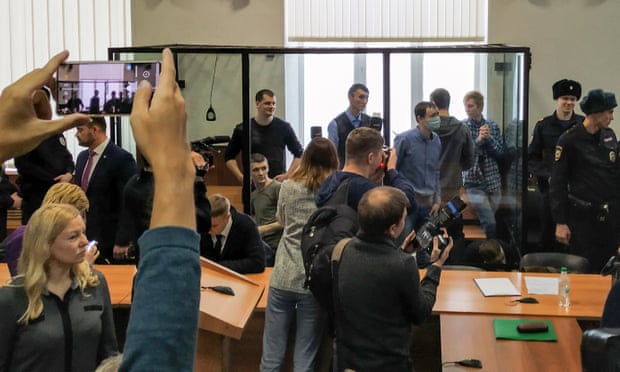A Russian court has sentenced a group of anti-fascists to between six and 18 years in prison on terrorism and other charges, with rights activists describing the punishment as monstrous.
Sergei Morgunov, a lawyer for one of the seven defendants, said a military court in the central city of Penza had handed down the verdict in the Network case. All seven had denied the charges.
Rights activists and defence lawyers have strongly criticised the investigation overseen by the FSB security service, a successor to the KGB, saying the men had been tortured.
Dmitry Pchelintsev and Ilya Shakursky were convicted of creating a “terrorist organisation”, among other charges, and sentenced to 18 and 16 years in prison respectively.
The FSB accused Pchelintsev, 27, of creating the Network organisation with the goal of overthrowing the government and seeking to attack government offices and employees. Five other men were found guilty of participating in the organisation.
Several members of the group were also convicted of the illegal possession of weapons and explosives and attempted drug trafficking. Five of the seven men will serve their terms in a maximum security prison.
Arrested in 2017 and 2018, most defendants have said they were tortured in custody with electrodes and beaten to extract confessions. One contracted tuberculosis last year while in custody, his relatives said.
The security service said it had found two Makarov pistols and grenade parts during searches.
The human rights organisation Memorial said the men were political prisoners, describing them as leftwing activists and anti-fascists.
Almost 50,000 people signed a petition demanding that the case be closed.
The Kremlin spokesman, Dmitry Peskov, said on Monday that Vladimir Putin had looked into the case on several occasions and tasked officials with making sure everything was “in accordance with the law”.
The Kommersant newspaper reported that the case against Network had been launched after a student detained by police on a drug charge confessed to participating in the group.
Memorial said there was a clear political motive behind the investigation, pointing to increasing repression against anarchists and anti-fascists. In 2018, the state-controlled NTV channel released a film accusing the men of self-harming while in custody and their supporters of being on the payroll of the west.
In an open letter, relatives of the defendants have called the charges against them “fabricated” and demanded a fair trial. “Everything in this case has been made up,” said the letter, released by For Human Rights, an NGO.
Oleg Orlov of Memorial said: “This is a monstrously harsh verdict, but we didn’t expect anything else.”
Independent media said the prosecution had failed to provide any concrete evidence in court. The Novaya Gazeta independent newspaper summarised the prosecution’s argument as follows: “They planned to plan something motivated by anarchist ideology in an undefined location at an undefined time in circumstances undefined by the investigation, together with undefined persons.”
Alexei Navalny said the case targeted an “invented terrorist organisation”. The opposition leader tweeted: “Any minister in the Russian government is 10 times more of a criminal and threat to public order than these guys.”
The Network affair is one of several cases initiated by the FSB. Critics say it is similar to another case against an alleged extremist organisation called the New Greatness whose members have also been accused of plotting to overthrow the government.
Critics say both cases have been fabricated by the security services using secret witnesses and confessions obtained under duress.








































admin in: How the Muslim Brotherhood betrayed Saudi Arabia?
Great article with insight ...
https://www.viagrapascherfr.com/achat-sildenafil-pfizer-tarif/ in: Cross-region cooperation between anti-terrorism agencies needed
Hello there, just became aware of your blog through Google, and found ...